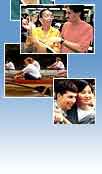CNN: "Right now, our medical system is overwhelmed
with many cases of relatively minor infections. If we can help shift some of
the routine diagnoses to simple at-home tests, then we give physicians more
time to treat patients with more serious ailments" -Benjamin Miller,
assistant professor of chemistry, outlining some of the benefits of the "smart
bandage" that he and Philippe Fauchet, professor and chair of electrical
and computer engineering developed.
The bandage uses a high-tech chip to sense whether bacteria is present in a
wound in order to alert patients to seek medical treatment.
Wall Street Journal: "The travel industry has
certainly been hurt. Lots of things that used to occur now occur in different
ways than they did before. That's likely to be a longer term change in the way
people behave . . . ."-William Schwert, Distinguished University Professor
and Gleason Professor of Finance and Statistics, discussing in January how last
fall's terrorist attacks could affect the 2002 stock market.
Associated Press: "Patients are people, and
they expect their physicians to be people as well"-Sam Huber '99, a
third-year medical student at the School of Medicine and Dentistry, on the practical
aspects of why he pursued a double major in biology and religion as an undergraduate.
Canadian Press: "It's what women have done for
women for centuries"-Ruth Lawrence, professor of pediatrics and obstetrics
and gynecology, on the role that peer support can play for new mothers who are
breastfeeding their newborn children.
Astronomy: "When some philosopher wannabe starts
pondering the existence of a chair in front of us, there's a strong urge to
take a cue from the World Wrestling Foundation and hit him or her over the head
with it. 'There,' you want to say. 'Now how real do you think it is?' In physics
and astronomy, things are different. You can't take answers for granted"-Adam
Frank, associate professor of physics and astronomy, offering a "real world"
example in an article he wrote to explain how physicists approach some of the
puzzles associated with studying the "dark matter" of the universe.
U-Wire: "We must break the thought that school
is over here and being black is over there. We must bring the two together"-Signithia
Fordham, associate professor of anthropology, discussing the conflict some African-American
students face if they feel they are being asked to abandon their culture when
they are taught standard English in school.
The New York Times: "I don't think that physicians
have to avoid Ritalin in treating children identified as having both A.D.H.D.
and a tic disorder"-Roger Kurlan, professor of neurology, commenting
on a study he led to explore the effectiveness of often prescribed medications
to treat children with attention deficit hyperactivity disorder who also suffer
from tic disorders.
The study found that drugs for A.D.H.D. have fewer side effects on the tic
disorders than had been commonly believed.
Maintained by University Public Relations
Please send your comments and suggestions to:
Rochester Review.
![[NEWS AND FACTS BANNER]](/URClipArt/news/titleNewsFactswide.jpg)

